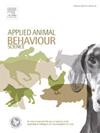通过积极的人与动物关系提高牲畜福利的机遇和挑战
IF 2.2
2区 农林科学
Q1 AGRICULTURE, DAIRY & ANIMAL SCIENCE
引用次数: 0
摘要
从农场动物的角度来看,消极的人与动物关系主要是通过恐惧和压力,损害动物的福利、健康和生产力。特别是在乳制品和养猪业的研究表明,饲养员的态度、饲养员的行为、动物的恐惧和压力与动物福利之间存在因果关系。同样,积极的关系可以改善动物的这些结果。此外,由于库存人员的态度和行为是可以改变的,因此可以通过适当的培训加以改进。事实上,认知行为训练已被证明可以改善饲养员对动物的态度和行为,从而减少对动物的恐惧,提高动物生产力。虽然我们对其他畜牧业中人与动物关系的含义的理解相对较差,但在其他畜牧业(如山羊、家禽和绵羊业)中,关于畜牧业态度、畜牧业行为和动物恐惧反应之间关系的证据有限。畜牧业显然需要对其人员进行培训,以便有效和人道地照顾和处理其动物。本文章由计算机程序翻译,如有差异,请以英文原文为准。
Opportunities and challenges to enhance the welfare of livestock through positive human-animal relationships
A negative human-animal relationship from the farm animal’s perspective can, mainly through fear and stress, compromise the animal’s welfare, health and productivity. Studies particularly in the dairy and pig industries demonstrate a causal link between stockperson attitudes, stockperson behaviour, animal fear and stress and animal welfare. Equally, a positive relationship can improve these outcomes for the animal. Furthermore, since stockperson attitudes and behaviour are amenable to change, they can be improved by appropriate training. Indeed, cognitive behavioural training has been shown to improve stockperson attitudes and behaviour towards animals, with consequent reductions in animal fear and improvements in animal productivity. While our understanding of the implications of the human-animal relationship in other livestock industries is relatively poor, there is limited evidence of relationships between stockperson attitudes, stockperson behaviour and animal fear responses in other livestock industries, such as the goat, poultry and sheep industries. There is a clear need for the livestock industries to train their personnel to care for and handle their animals effectively and humanely.
求助全文
通过发布文献求助,成功后即可免费获取论文全文。
去求助
来源期刊

Applied Animal Behaviour Science
农林科学-行为科学
CiteScore
4.40
自引率
21.70%
发文量
191
审稿时长
18.1 weeks
期刊介绍:
This journal publishes relevant information on the behaviour of domesticated and utilized animals.
Topics covered include:
-Behaviour of farm, zoo and laboratory animals in relation to animal management and welfare
-Behaviour of companion animals in relation to behavioural problems, for example, in relation to the training of dogs for different purposes, in relation to behavioural problems
-Studies of the behaviour of wild animals when these studies are relevant from an applied perspective, for example in relation to wildlife management, pest management or nature conservation
-Methodological studies within relevant fields
The principal subjects are farm, companion and laboratory animals, including, of course, poultry. The journal also deals with the following animal subjects:
-Those involved in any farming system, e.g. deer, rabbits and fur-bearing animals
-Those in ANY form of confinement, e.g. zoos, safari parks and other forms of display
-Feral animals, and any animal species which impinge on farming operations, e.g. as causes of loss or damage
-Species used for hunting, recreation etc. may also be considered as acceptable subjects in some instances
-Laboratory animals, if the material relates to their behavioural requirements
 求助内容:
求助内容: 应助结果提醒方式:
应助结果提醒方式:


